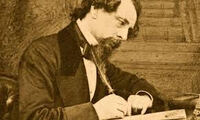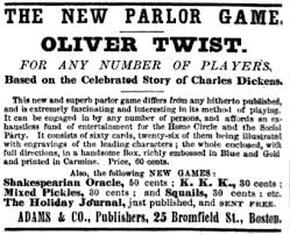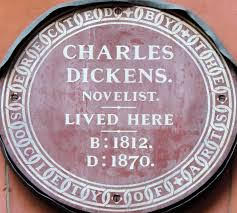LESSON 6
History by Dickens: How one of the world's great novelists wrote about the story of his own country.
History by Dickens: How one of the world's great novelists wrote about the story of his own country.
|
HISTORY, which is all true (or it wouldn’t be history), is my favorite subject: Now some books make history’s true stories dull, which is awful. My advice: avoid those books. Good authors know how to tell true stories. Keep in mind, sometimes we don’t know the whole truth about the past. So the search for that truth can make history really fascinating. Charles Dickens, one of my favorite authors, was a history-lover. He wrote “A Child’s History of England,” a book with heroes and villains and adventures. It was published in 1905, which makes it very old and a bit out of date, but mostly it is good reading. Here is some of it. You can find the whole book on the web.
…Alfred the Great was a young man, three-and-twenty years of age, when he became king. Twice in his childhood, he had been taken to Rome, where the Saxon nobles were in the habit of going on journeys which they supposed to be religious; and, once, he had stayed for some time in Paris. Learning, however, was so little cared for, then, that at twelve years old he had not been taught to read; although, of the sons of King Ethelwulf, he, the youngest, was the favourite. But he had—as most men who grow up to be great and good are generally found to have had—an excellent mother; and, one day, this lady, whose name was Osburga, happened, as she was sitting among her sons, to read a book of Saxon poetry. The art of printing was not known until long and long after that period, and the book, which was written, was what is called ‘illuminated,’ with beautiful bright letters, richly painted. The brothers admiring it very much, their mother said, ‘I will give it to that one of you four princes who first learns to read.’ Alfred sought out a tutor that very day, applied himself to learn with great diligence, and soon won the book. He was proud of it, all his life. This great king, in the first year of his reign, fought nine battles with the Danes. He made some treaties with them too, by which the false Danes swore they would quit the country. They pretended to consider that they had taken a very solemn oath, in swearing this upon the holy bracelets that they wore, and which were always buried with them when they died; but they cared little for it, for they thought nothing of breaking oaths and treaties too, as soon as it suited their purpose, and coming back again to fight, plunder, and burn, as usual. One fatal winter, in the fourth year of King Alfred’s reign, they spread themselves in great numbers over the whole of England; and so dispersed and routed the King’s soldiers that the King was left alone, and was obliged to disguise himself as a common peasant, and to take refuge in the cottage of one of his cowherds who did not know his face. Here, King Alfred, while the Danes sought him far and near, was left alone one day, by the cowherd’s wife, to watch some cakes which she put to bake upon the hearth. But, being at work upon his bow and arrows, with which he hoped to punish the false Danes when a brighter time should come, and thinking deeply of his poor unhappy subjects whom the Danes chased through the land, his noble mind forgot the cakes, and they were burnt. ‘What!’ said the cowherd’s wife, who scolded him well when she came back, and little thought she was scolding the King, ‘you will be ready enough to eat them by-and-by, and yet you cannot watch them, idle dog?’ At length, the Devonshire men made head against a new host of Danes who landed on their coast; killed their chief, and captured their flag; on which was represented the likeness of a Raven—a very fit bird for a thievish army like that, I think… they believed it to be enchanted—woven by the three daughters of one father in a single afternoon—and they had a story among themselves that when they were victorious in battle, the Raven stretched his wings and seemed to fly; and that when they were defeated, he would droop. He had good reason to droop, now, if he could have done anything half so sensible; for, King Alfred joined the Devonshire men; made a camp with them on a piece of firm ground in the midst of a bog in Somersetshire; and prepared for a great attempt for vengeance on the Danes, and the deliverance of his oppressed people. [King Alfred lived in the 9th century C.E. (871-899). The Vikings, who were fierce warriors, were trying to take over England and might have done it if Alfred hadn’t defeated them. That’s one reason the British call him Alfred the Great.] |
Charles Dickens
These lessons are intended for your use at home. They are copyrighted by Joy Hakim and are not for commercial use or redistribution. Something for you to do: Write a history. Of your family, of your town, of anything or anyone you choose. You can start with an interview. Do you have a grandparent who may have stories to tell? What was his/her childhood like? Ask questions that call for details and word pictures. Maybe you will have to do your interview by email. Go for it. Perhaps your grandfather was born in another country, do some research, see what you can learn about that country. Add information to your true story. Is there someone who has known your grandparent for a long time? (Maybe your parent.) Interview that person for more details. Take notes, quote accurately. Write a first version of your true story (known as a first draft). Read it and see what can be improved. Do some more research. Write another version. You are on your way to becoming a historian. |



